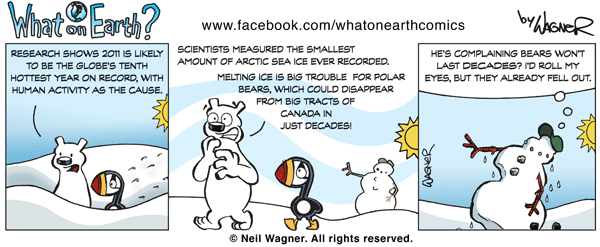

When it comes to climate change, the 2000s are a dynasty. 2011 is being recognized as the tenth-hottest year on record. 2010 tops the charts -- tied (by some estimates) with 2005. When 2009 came to an end, it was the fifth-warmest. In fact, the decade of the 2000s was warmer than the decade of the '90s, which was warmer than the 1980s .
The poles are warming faster than the rest of the planet, which leads to (you guessed it) lots of melting ice. 2011 boasts the lowest volume of Arctic sea ice on record, and scientists point to global warming as the culprit. Not only was there less volume, but the Arctic sea ice coverage turned out to be the second-lowest ever.
While these developments are exciting news for people who only care about seeing records broken, it's all very problematic for others. The complaints of snowmen are certainly compelling, but polar bears' survival is of greater concern. Warmer temperatures and later freezes are keeping bears on the Canadian mainland later and later each year. This situation ultimately leads to more contact with humans (not good if you're a polar bear) less feeding and fewer births. The Huffington Post's Dean Praetorius quotes wildlife biologist Ian Stirling as saying he believes this will all lead to polar bears' disappearance from portions of Manitoba, Ontario and Quebec within decades.
If sea ice disappears completely, it's likely polar bears will, as well.
Like "What on Earth?" on Facebook.